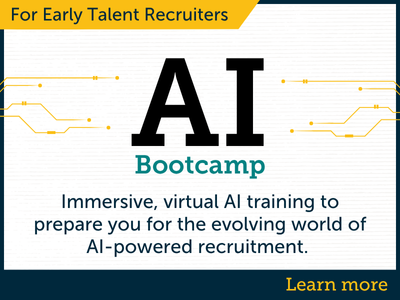Opportunities for HBCUs and industry leaders to seek areas of common ground and support each other to achieve mutually beneficial objectives are ever present, says Julian Thompson, senior director of strategy development, UNCF Institute for Capacity Building.
Thompson cites data that show that 50% of Black Americans in the United States live within 50 miles of an HBCU. This is important, he says, because industry leaders looking to establish career pathways can access diverse talent at HBCUs and achieve workforce goals.
“HBCU career pathways are often the primary driver for conversations and alignment between HBCUs and industry leaders,” Thompson says.
"While that is a great start, there’s an opportunity for deeper connectivity between the leadership of industry and corporations and the HBCUs they operate in and around.”
The most prominent element of a successful partnership between an HBCU and an employer is deepened awareness of understanding.
“For the HBCU, there needs to be a concerted and intentional effort to understand the demands and challenges of what industry leaders are facing,” Thompson notes.
“Oftentimes, this means understanding more about that industry, its growth and trajectory, and the skills and capabilities that are needed to meet the changing demands of the workforce.”
On the other side, the awareness from industry leaders must start with an acknowledgement of how HBCUs have operated within their regions for generations.
2025 HBCU and Inclusion Summit
Join us virtually February 19-20, 2025 for NACE’s 2025 HBCU & Inclusion Summit. We’ll unite professionals from industry employers, HBCUs, and other higher education institutions to share data, strategies, and tactics for recruiting and supporting various student populations.Register here
“Due to historic discrimination, industry leaders often do not have direct experiences with HBCU campuses, so they need to work intentionally to grasp the full magnitude of what HBCUs offer,” he says.
“The fact is that, for generations, HBCUs have provided the type of education that helps underserved communities uplift themselves and connect to the types of employment experiences that not only help that student, but their family and their community. HBCUs use a unique approach in higher education to achieve that mission.”
Another key element is behavioral change. Thompson explains that for industry leaders, this means investing in the types of activities that position them to embrace diverse communities and diverse institutions.
“At a foundational level, there are career pathways, meaning the development of internships, mentorship programs, and early career programs that help individuals once they've gotten a position in the industry to be successful in their first few years as employees,” he says.
“We have an evidence-based foundation for knowing that investment in career pathways helps students be successful. Industry leaders can continue to reinforce the internship, mentorship, hiring, and early career systems and structure and make sure that it’s as supported as those that exist at predominantly white institutions.”
Beyond these pathways, employers can focus on connecting with and supporting faculty.
“Employers need to ensure faculty understand the skills and capabilities that are in increasing demand by industry, and help those faculty members tailor their curriculum, their pedagogical approach, and potentially connect to different technologies or capabilities within the classroom to help their students be successful in their early careers,” Thompson says.
“Similarly, HBCUs need to continue to evolve so that their curricular offerings, their degree programs, the skills that they prioritize within the classroom, and how they organize their boards of trustees and other governance structures are in better alignment with industry priorities.”
To help in these and other areas, the UNCF’s Institute for Capacity Building was founded in 2006 by Michael Lomax, Ph.D. Dr. Lomax, the institute’s current president and CEO who refers to the institute as the innovation arm of UNCF, started it to help HBCUs develop their people better, create new systems and processes, and embrace technologies in ways that they hadn't done in the past.
“Increasingly, we are seeking to operate as a network. All higher education institutions in the United States—including HBCUs—must find ways to collaborate,” Thompson says.
“We believe that if we have the conditions for Black colleges to work together on change management, innovation, transformation, and sustainability, they will be able to help each other identify the systems, partnerships, and modes of operation that are aligned with the HBCU context. They can pilot initiatives more quickly and seamlessly by doing so in collaboration with each other and through that mechanism of collaboration and networking, help each other achieve the transformation that all higher education institutions desire. That is north star for the Institute for Capacity Building.”
Some of the work of the UNCF’s Institute for Capacity Building includes:
- An annual conference called UNITE, which brings together Black colleges and universities to consider the questions, ideas, innovations, and partnerships that can help them transform.
- A UNITE 2024 industry collaboration pre-summit workshop that included representation from a range of corporate partners—including Deloitte, Bank of America, Disney, and Target—and a fireside chat with Steve Bandrowczak, CEO of Xerox.
- The HBCU Collective Impact Opportunity, an initiative spearheaded by Deloitte that has brought together HBCU and industry leaders to build better awareness about the history of HBCUs, their current successes, and opportunities for future engagement.
In 2023, the UNCF Institute for Capacity Building concluded a grant called the Career Pathways Initiative with 24 HBCUs and predominately Black institutions to develop strategies that would lead to meaningful change at their institutions. Several South Carolina HBCUs participating in the initiative launched the South Carolina Institutes of Innovation and Information (SCIII), a network of institutions developing opportunities for industry engagement and involvement.
“The Career Pathways Initiative was a tremendously successful program,” Thompson notes.
“Just before the pandemic, South Carolina HBCUs hosted the largest career fair in the history of South Carolina. That work was the foundation for SCIII, a new initiative that's currently in place in South Carolina in which HBCUs and industry leaders are, in a very intentional way, finding space for each other to build some of the curricular and career pathways approaches that can help students in that state thrive.”
Also in South Carolina, Zoom has developed an innovative partnership with Claflin University in which one of Zoom's leaders became a member of Claflin’s Board of Trustees.
“That's an example of the type of relationship where, although it may have had career pathways and skill development as the foundation, Zoom took it upon itself to not only work on those aspects, but to be involved in the long-term improvement and sustainability of Claflin University,” Thompson says.
“That board placement signaled a depth of the relationship that is really exciting and we hope others emulate.”
Thompson points out that effective relationships have industry investing in the long-term future of the HBCUs that they operate in and with.
“Industry leaders know that an HBCU is and has for a long time generated the type of talent that's in demand by their industry and by their organization,” he explains.
“In a transformative partnership, industry sees HBCUs as long-term partners and have a better understanding, not just of the career pathways or faculty development needs, but of the broader needs of the campus, whether that be infrastructure, a better grounding of their financial health, or connecting their executive leadership to new opportunities and having a seat at tables where they have not had prior access.
“In this ideal circumstance, there are industry leaders who believe in the long-term viability of HBCUs and [are committed to] ensuring that they continue to be places where their students and faculty can thrive, because that will ultimately generate the outcomes industry is looking for.”
Julian Thompson will be a keynote presenter during NACE’s 2025 HBCU & Inclusion Summit.






